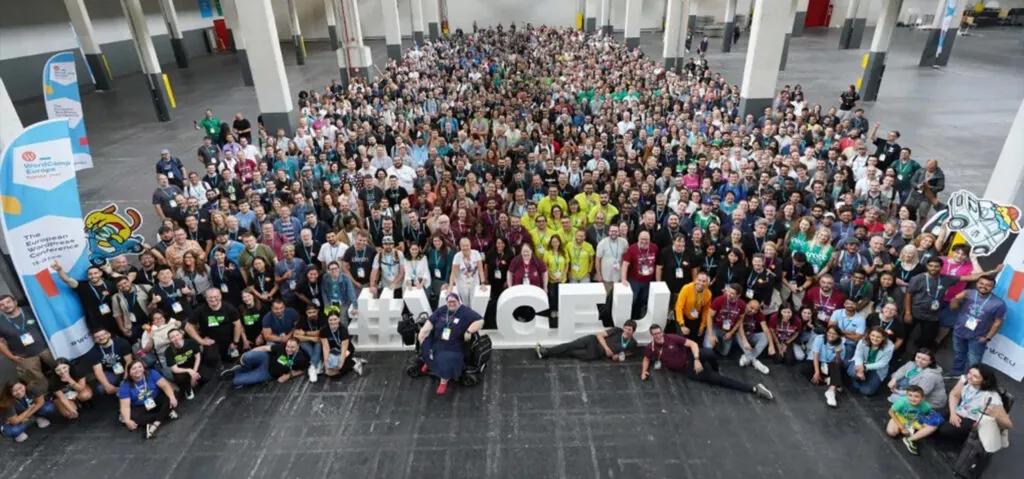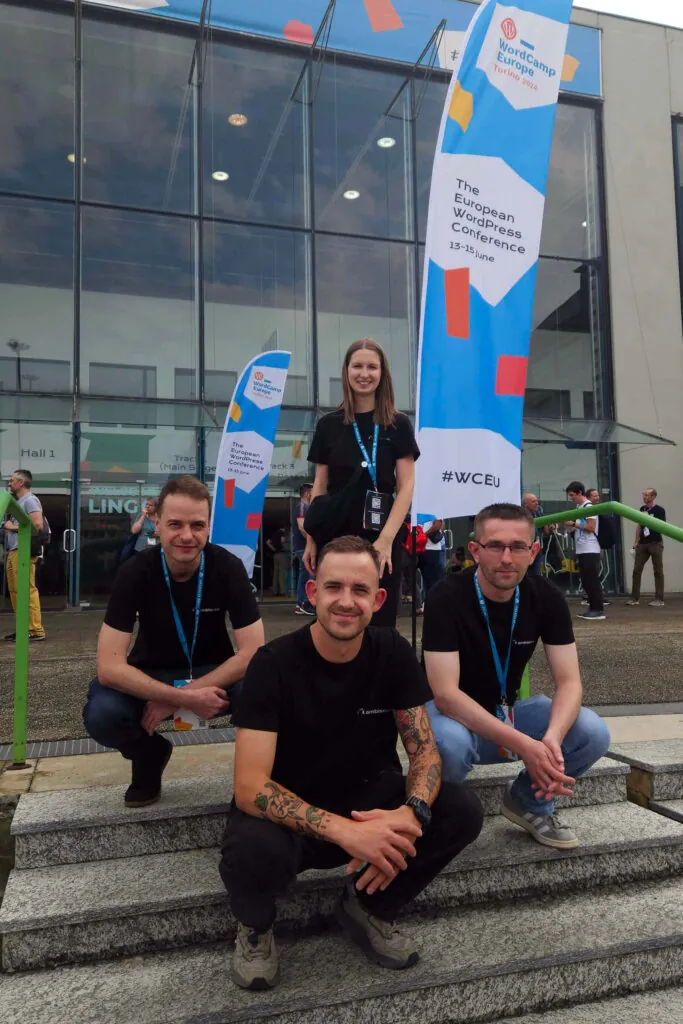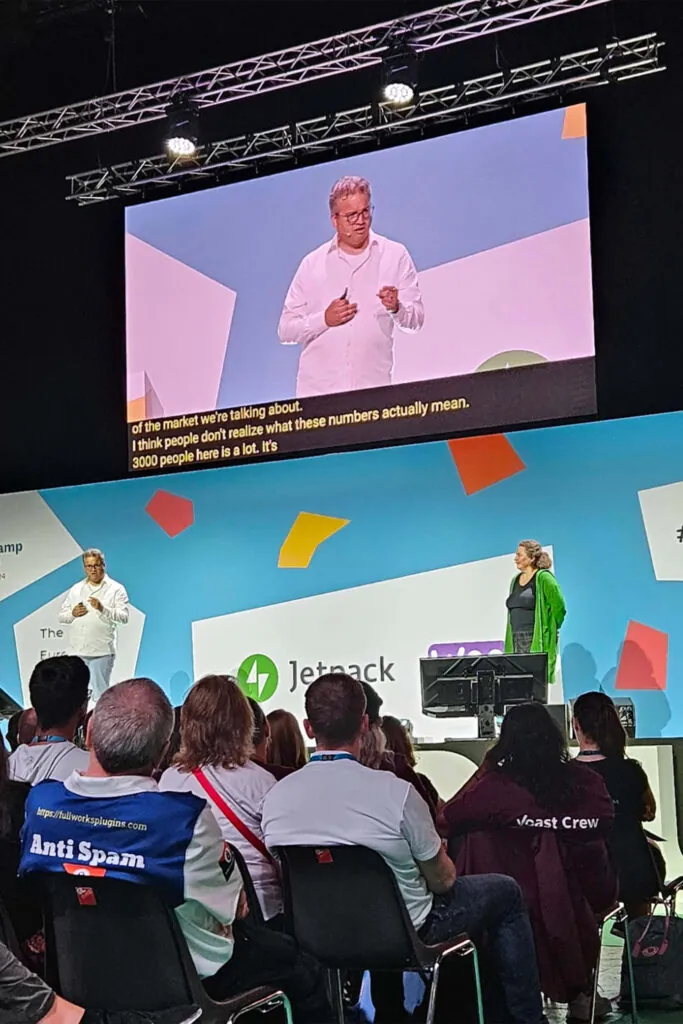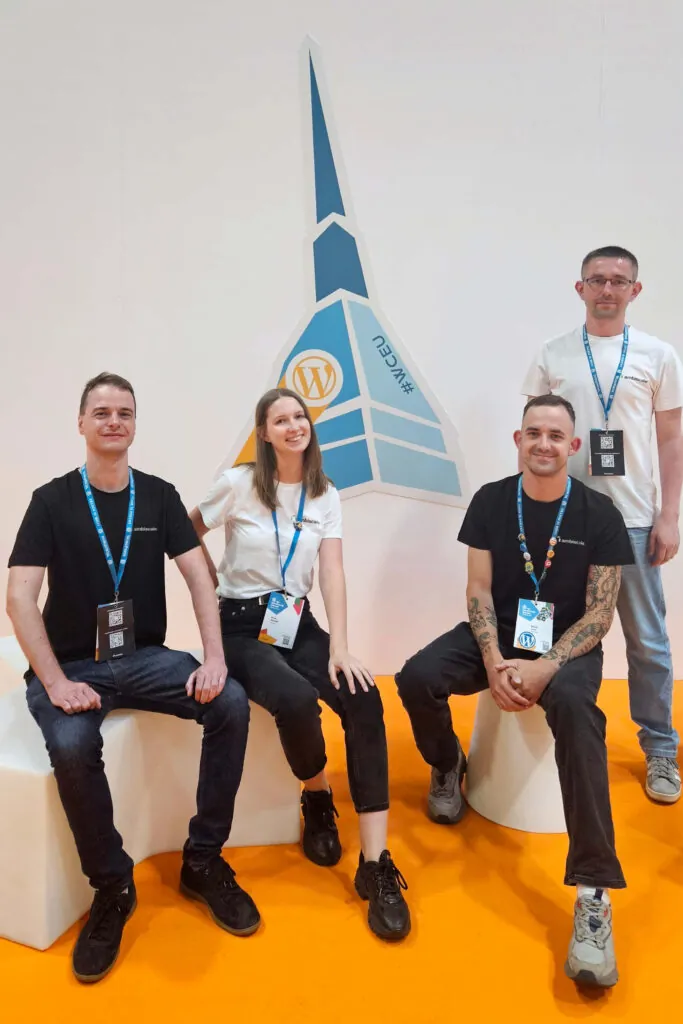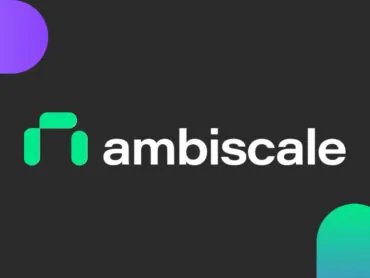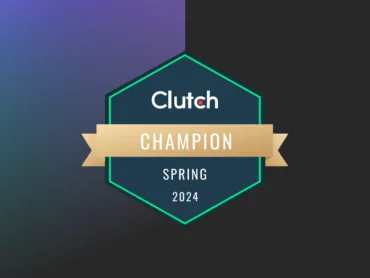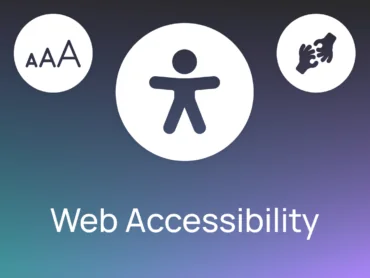What we liked about WordCamp Europe 2024
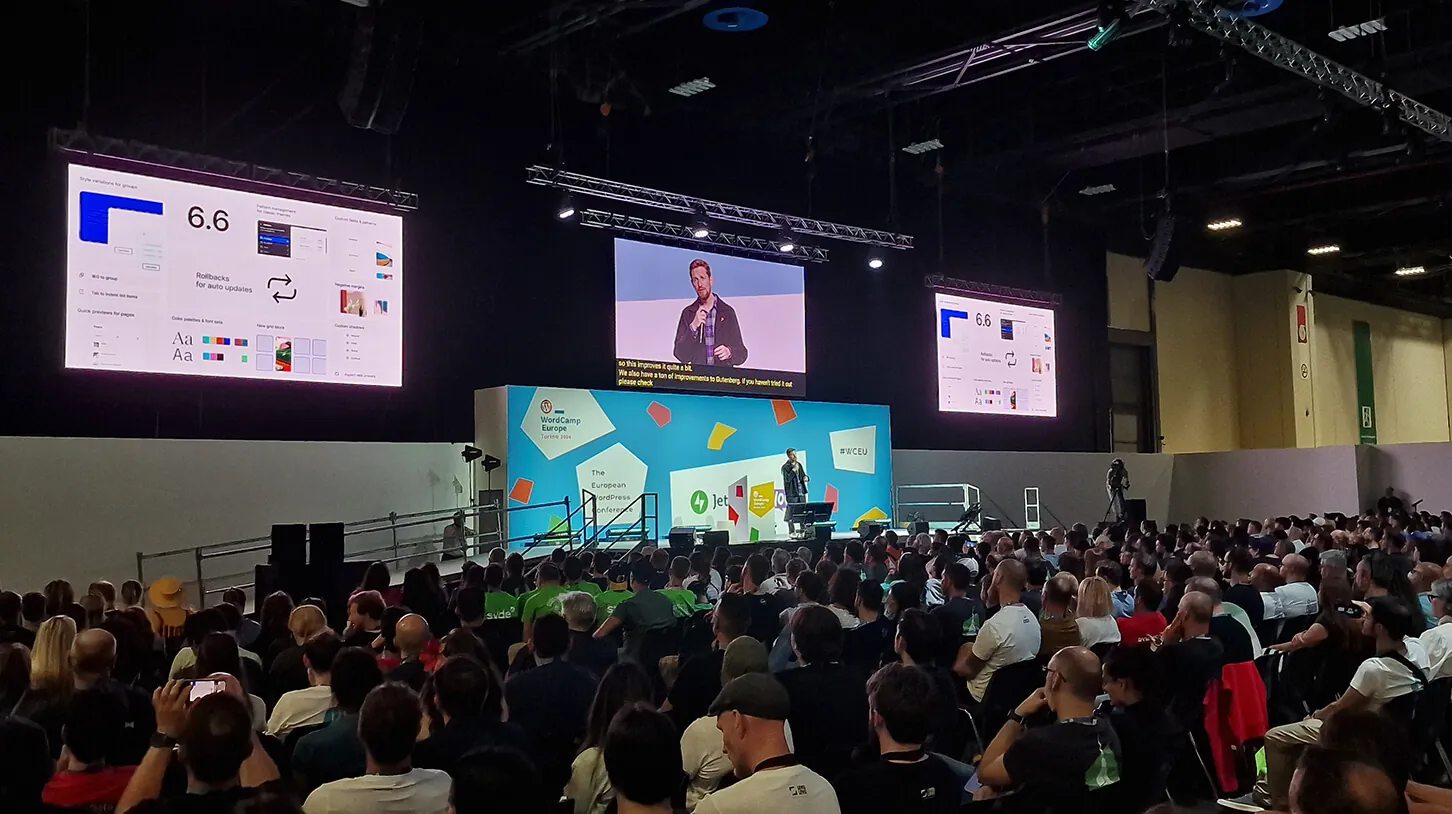
Last week, we had the pleasure of attending WordCamp Europe 2024 in Turin. WordCamp is a conference dedicated to all things WordPress. This year’s event was inspiring, with over 2,500 attendees from around the globe gathering to share insights and network with the WordPress community. We’ve compiled a recap of the event, highlighting what we enjoyed the most, and listed 10 sessions we found most valuable. Read on to discover our favorite things about WCEU 2024!
WP Community
WordCamp events give an incredible opportunity to connect with the WordPress community. At the event, you can meet a diverse group of individuals, including developers, C-level executives, marketers, and even members of the Core WordPress team.
The WordPress community is known for its collaborative spirit and strong bonds. The conference was filled with people who have worked with WordPress in the past and, despite branching out into other areas of development, still support and want to be part of the community. Through networking, workshops, and Q&A sessions, everyone can share their experiences and contribute to the evolution of WordPress-related tools.
An essential aspect of WordCamp is the Code of Conduct, which provides a welcoming and inclusive environment for all attendees. The values promote respect and a positive experience for everyone involved.
Inspiring sessions
The event featured simultaneous sessions across three tracks, with 52 speakers. There was a broad range of topics, covering Development, Accessibility, Design, Security, Sustainability, AI, Community, SEO, and Business. The schedule was packed, offering something of interest to everyone in attendance.
With so many sessions to choose from, deciding which ones to attend was challenging. We chose 10 sessions that stood out the most and provided valuable insights.
The European Accessibility Act Explained
One of the standout sessions was “The European Accessibility Act Explained” by Rian Rietveld. Rian provided a clear and detailed explanation of the European Accessibility Act, emphasizing the importance of aiming for WCAG 2.2 AA website compliance as a future-proof standard. She cautioned against quick fixes like accessibility overlays, which falsely promise to meet WCAG requirements through AI widgets. Her presentation was constructive, highlighting the long-term financial and ethical consequences of ignoring accessibility. She also offered practical advice on how to prepare for and implement accessibility measures effectively.
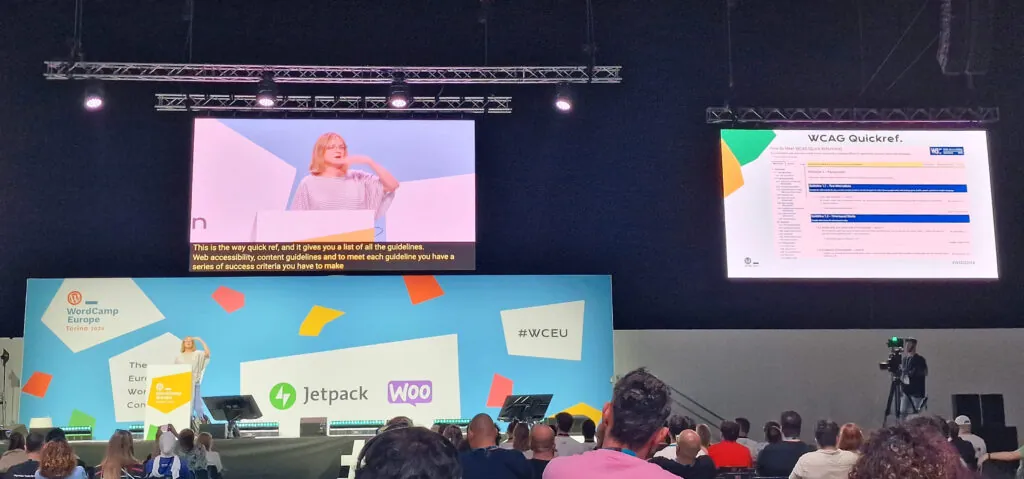
Think Like a Hacker: Attack Your WordPress
Matthias Held, a security expert, provided valuable insights into a hacker’s mindset and demonstrated how to identify and exploit vulnerabilities within WordPress sites. His session illustrated the importance of proactive security measures.
The speaker showcased examples of obtaining sensitive data from WordPress. These included:
- retrieving partial login information or confidential files from not properly secured REST API endpoints;
- getting hold of database credentials from wp-config.php.backup or similarly named files found on the server;
- exploiting unrestricted file upload form fields with SVG files that enabled him to execute JavaScript for cross-site scripting.
Through this approach of thinking like a hacker, attendees gained a deeper understanding of the potential threats and learned how to fortify their websites against attacks.
Pivoting Procrastination towards Progress
Marieke van de Rakt’s session, “Pivoting Procrastination towards Progress,” addressed a common issue that many of us face: procrastination, especially regarding website maintenance tasks. Marieke shared her personal experiences and practical strategies for overcoming procrastination. She explained why website maintenance is prone to delays and provided key takeaways on tackling this issue. She advised everyone to be kind to themselves and celebrate progress. The idea resonated deeply with the audience, many of whom struggle with burnout. The session was both motivational and practical, offering attendees a fresh perspective on managing their workload and maintaining their websites effectively.
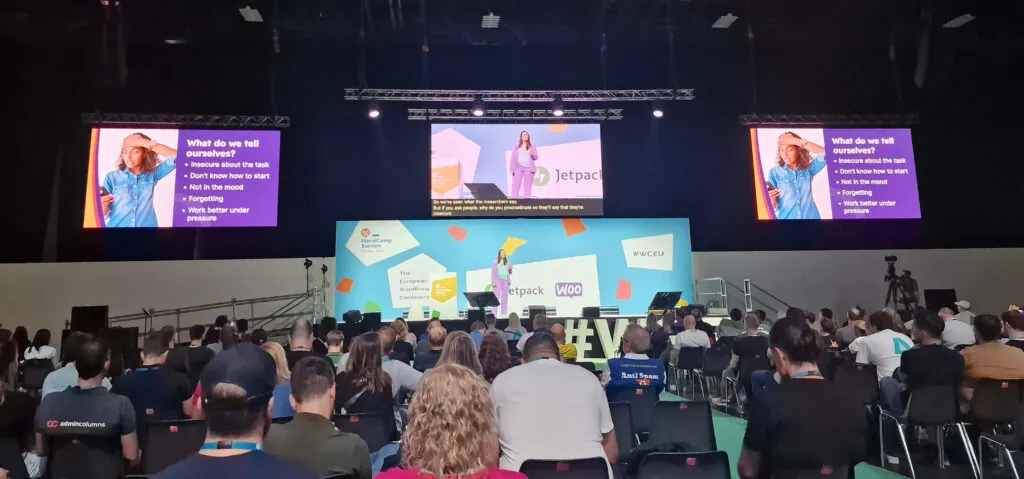
Practical Techniques for Sustainable Web Development with WordPress
Bjarne Oldrup’s session delved into the environmental impact of web development, providing a comprehensive overview of how to estimate web carbon emissions. He discussed factors such as data transfer over the wire, the energy intensity of web data, energy used by data centers, carbon intensity of electricity, and website traffic. One of the interesting takeaways was the DTHS rebuild example, which demonstrated how a lightweight design can deliver the expected features of a typical website while maintaining a modest carbon footprint.
WordPress.org Plugin Repository: A Year in Review
Francisco Torres presented an insightful session titled “WordPress.org Plugin Repository: A Year in Review.” The session offered practical tips on avoiding common pitfalls and ensuring the plugins meet the repository standards. Francisco provided a behind-the-scenes look at the plugin verification process, explaining how plugins are checked and verified internally. He reviewed the common issues with WordPress plugins, such as incorrect plugin names, broken links, outdated compatibility information, and inaccurate descriptions. In addition to these issues, most of the submitted plugins are insecure. It is crucial to implement proper security measures such as sanitizing data, escaping output, using nonces, and setting appropriate permissions. Also, it was interesting to see how internal work in the Plugin Repository looks.

Please Leave a Gap: The Importance of White Space in Web Design
In this session, Ioanna Aravani discussed the benefits of incorporating whitespace into web design, such as improved legibility, enhanced readability, better user experience, and higher conversion rates. She provided practical tips for using whitespace effectively, including proper text formatting, margins and padding, balance and clarity, and considerations for mobile design and touchscreen interfaces. The session resonated with us, as we often notice that whitespace is overlooked during web design, especially for mobile interfaces.
Interactivity API: The New Standard Way to Build Modern WordPress Frontends
During this presentation, Michał Czapliński highlighted the benefits of the Interactivity API, including its small size, lazy loading capability similar to Astro, use of a single framework for all plugins, optimized rendering, and seamless integration with WordPress hooks and filters. He also demonstrated how the API enables inter-block communication, making frontend development more efficient and cohesive. The session included practical examples, showcasing the API’s potential to revolutionize how modern WordPress frontends are built. The session was helpful for developers looking to adopt cutting-edge tools and techniques in their projects.
Block Hooks: A New API to Extend Block Themes
Bernie Reiter’s session introduced attendees to a new feature in WordPress 6.4. The Block Hooks API is a powerful extensibility mechanism allowing developers to insert blocks into block themes dynamically. This new feature is a significant development in the WordPress ecosystem, offering enhanced flexibility and customization options for theme developers. Bernie’s presentation provided a comprehensive overview of how to utilize this API effectively. If you want to dive deeper, you can find more information in the official WordPress developer news article.
We Spoke with Over 50 Different WordPress Product Owners: Here’s What We Learned
Katie Keith and Matt Cromwell’s session was a treasure trove of insights. Based on interviews with various experts, the session showed key takeaways for growing and improving WordPress products. They emphasized the importance of being part of the WordPress community for continuous learning and product development, which we wholeheartedly agree with.
The session was packed with practical tips and strategies.
Some of the most exciting advice included:
- Experimentation: Tailor your approach to accommodate different learning styles and avoid assuming one method works for all customers.
- When & What to Outsource: Focus on tasks you enjoy and excel at, and consider outsourcing the rest.
- Data Enhancing Usability: Use data from your support system to learn from your customers. Cultivate curiosity about feedback to improve usability, not just feature sets.
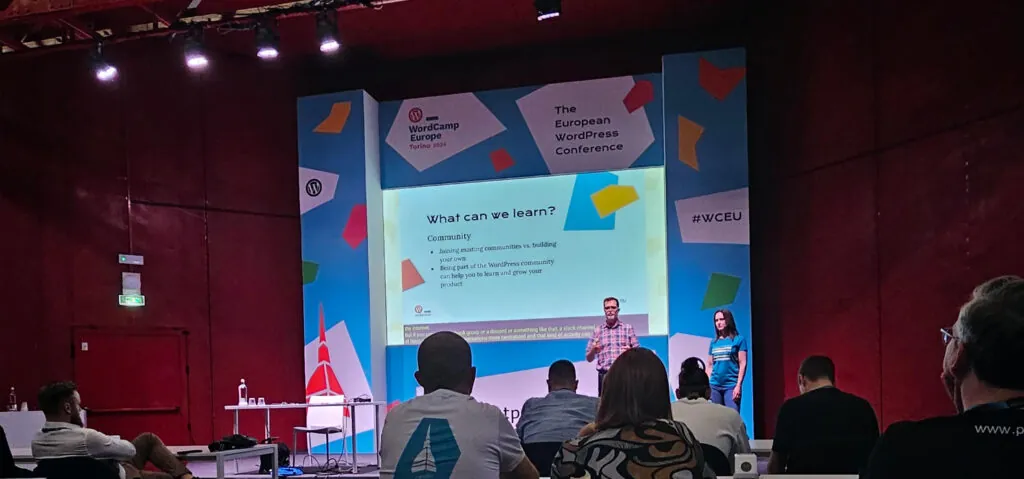
Outsmart, Outrank: SEO Gap Analysis Unveiled
Lidia Infante’s session was an insightful exploration of effective SEO strategies using accurate case study data. Lidia’s presentation stood out for its practical application of SEO gap analysis, demonstrating techniques with genuine data, which added immense value for attendees. She discussed a top-down approach for researching competitors and a bottom-up framework for improving SEO.
Key aspects included the importance of context-specific metrics, such as CWV scores, PageSpeed Insights scores, manual checks, effective Competitor Analysis, and identifying SEO Gaps. This session benefited anyone looking to enhance their SEO strategy with actionable, data-driven insights.
Keynote speech by WP Co-Founder: WordPress Project Summer Update
The last session at WCUE was one of the most important and attracted almost all the event participants. Matt Mullenweg, Co-Founder of WordPress, spoke about the future of WordPress.
He emphasized the importance of open-source development, community collaboration, and the evolving role of artificial intelligence in content creation and website management. Mullenweg also discussed upcoming features and improvements in WordPress, including enhanced block editor capabilities, better performance, and increased accessibility. He highlighted the importance of user feedback in shaping the platform’s future and encouraged contributions from developers worldwide.
The presentation was followed by a live Q&A, during which every attendee could ask Matt a question. This Keynote presentation was a perfect culmination of the whole event.
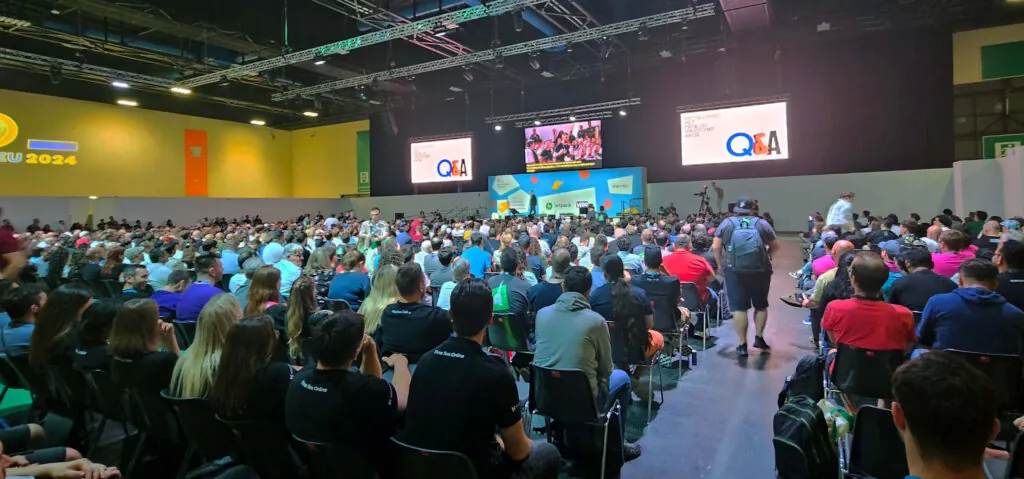
Summary
We are thrilled to have participated in WCEU 2024. Events like WordCamp broaden horizons, and we highly recommend them to anyone involved with WordPress. This occasion gave us a significant boost of motivation, inspiration, and a drive to take action. We thank the organizers for orchestrating such a well-organized event, including the sponsor areas and additional activities.
This year, we are also looking forward to WordCamp Poland, which will be held in Gdynia and Wrocław. And excitingly, WordCamp Europe 2025 will take place in Switzerland. See you there!
